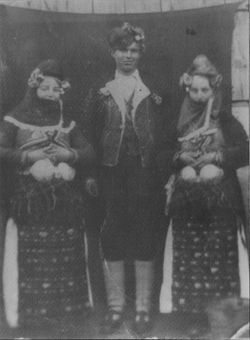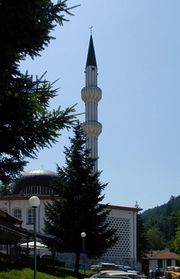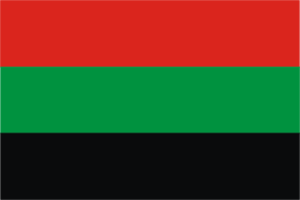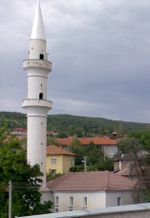پوماك
(تم التحويل من بوماك)
 Pomaks in the early 20th century | |
| التعداد الإجمالي | |
|---|---|
| ح. 1 million[1] | |
| المناطق ذات التواجد المعتبر | |
| 350,000[1]- 600,000[2] | |
| 67,350 Muslim Bulgarians (2011 census)[3] up to 250,000 incl. of Turkish and of no ethnic identity[1] | |
| 40,000 Muslim Macedonians up to 100,000 incl. Turkified[1] | |
| 50,000 in Western Thrace[1] | |
| اللغات | |
| البلغارية كلغة أم،including different Bulgarian dialects as part of the wider Bulgarian dialect continuum as native language[4][5][6][7] كلغة ثانية: التركية، اللغة الألبانية، اليونانية. | |
| الديانة | |
| إسلام سني | |
| الجماعات العرقية ذات الصلة | |
| بلغار، Macedonians، مسلمون سلاڤ | |
پوماك (بالبلغارية: Помаци, باليونانية: Πομάκοι, تركية: Pomaklar؛ إنگليزية: Pomaks) هم جماعة سكانية من المسلمين السلاڤ موطنهم في بلغاريا، تركيا، اليونان، جمهورية مقدونيا، ألبانيا وكوسوڤو. ولغتهم الأم هي اللغة البلغارية [4][5][6][7] وبعضهم يتحدث بطلاقة التركية والألبانية واليونانية كلغة ثانية.[8][9] هناك جدل حول أصل البوماك،[10][11]ولكنهم يُعتبروا اليوم أحفاد البلغار الأصليين الذين اعتنقوا الإسلام أثناء الحكم العثماني للبلقان.[12][13][14][15][16] ويدعي أعضاء من تلك الجماعة هويات عرقية مختلفة: بلغار،[17][18] پوماك،[19][20][21] المسلمون،[22] أتراك، ألبان وغيرهم.
التاريخ
نظريات أخرى عن الأصل

مسجد في Madan in the Rhodopes, a region largely populated by Pomaks
المصادر
- ^ أ ب ت ث ج Carl Skutsch (7 November 2013). Encyclopedia of the World's Minorities. Routledge. pp. 974–. ISBN 978-1-135-19388-1.
- ^ "Türkiye'deki Kürtlerin sayısı!" (in Turkish). 6 June 2008. Retrieved 17 August 2010.
{{cite web}}: CS1 maint: unrecognized language (link) - ^ 2011 Bulgarian census, p.29 (in Bulgarian)
- ^ أ ب Ethnologue, Languages of Greece.Bulgarian.
- ^ أ ب "Ethnologue: Languages of the World Fourteenth Edition.Bulgarian". Archived from the original on 16 يناير 2009. Retrieved 3 ديسمبر 2018.
- ^ أ ب Encyclopaedia Britannica, Pomak People.
- ^ أ ب Social Construction of Identities: Pomaks in Bulgaria, Ali Eminov, JEMIE 6 (2007) 2 © 2007 by European Centre for Minority Issues
- ^ [1] THE POMAKS, Report - Greek Helsinki Monitor
- ^ [2] The World Directory of Minorities and Indigenous Peoples
- ^ Vemund Aarbakke, The Muslim Minority of Greek Thrace, University of Bergen, Bergen, 2000, pp.5 and 12 (pp. 27 and 34 in the pdf file). [3]
- ^ Olga Demetriou, "Prioritizing 'ethnicities': The uncertainty of Pomak-ness in the urban Greek Rhodoppe, in Ethnic and Racial Studies, Vol. 27, No. 1, January 2004, pp.106-107 (pp. 12-13 in the pdf file). [4]
- ^ The Balkans, Minorities and States in Conflict (1993), Minority Rights Publication, by Hugh Poulton, p. 111.
- ^ Richard V. Weekes; Muslim peoples: a world ethnographic survey, Volume 1; 1984; p.612
- ^ Raju G. C. Thomas; Yugoslavia unraveled: sovereignty, self-determination, intervention; 2003, p.105
- ^ R. J. Crampton, Bulgaria, 2007, p.8
- ^ Janusz Bugajski, Ethnic politics in Eastern Europe: a guide to nationality policies, organizations, and parties; 1995, p.237
- ^ http://www.nsi.bg/Census/StrReligion.htm
- ^ Muslim identity and the Balkan State; Hugh Poulton, Suha Taji-Farouki; 1997, p. 102
- ^ Interview With Mr. Damjan Iskrenov* and Mr. Shikir Bujukov* from the Village of Kochan – Pomaks from Chech, Western Rodop Mountains (Pirin Part of Macedonia), R. Of Bulgaria
- ^ READING ROOM 3: Raw deal for the Pomaks
- ^ Помаците искат да бъдат признати като етнос
- ^ Histories and Identities: Nation-state and Minority Discourses. The Case of the Bulgarian Pomaks. Ulf Brunnbauer, University of Graz
وصلات خارجية
- http://www.pomak.eu/
- http://www.greekhelsinki.gr/english/reports/pomaks.html (related to Greek Pomaks)
This article contains content from Wikimedia licensed under CC BY-SA 4.0. Please comply with the license terms.
تصنيفات:
- "الجماعات العرقية ذات الصلة" تحتاج تأكيد
- Articles using infobox ethnic group with image parameters
- Articles containing بلغارية-language text
- Articles containing Greek-language text
- Pages using Lang-xx templates
- Articles containing إنگليزية-language text
- مجتمعات مسلمة
- جماعات عرقية في بلغاريا
- جماعات عرقية في اليونان
- جماعات عرقية في تركيا
- جماعات عرقية في ألبانيا
- جماعات عرقية في كوسوڤو
- سلاڤ الجنوب
- مجتمعات مسلمة في اوروبا


